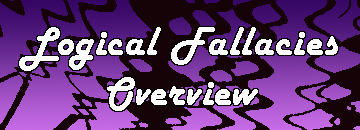



OVERVIEW OF LOGICAL FALLACIES
Arguments can be constructed in many forms. Not all are considered ‘valid’. The forms that are deemed to be valid are those where if the premises are true, the conclusion is necessarily true.
If a formally correct (valid) argument, also contains true premises, it is said to be ‘sound’. Whilst a sound, valid argument, is the best kind of formal argument, formal logic can only verify an argument's validity, not it's soundness. So it can't determine the actual truth of conclusions without looking into the truth of the premises.
e.g. Politician: ‘Climate change is not caused by carbon emissions. So, reducing our emissions will not avert climate change.’
A valid argument (if the premise is true the conclusion is true), but it's soundness depends on the truth of the premise.
Arguments that lead to conclusions that aren't necessarily true are called logical fallacies but one view is that an invalid or unsound argument can only be called a 'fallacy' if it employs trickery or deceit.1* Based on the broader definition logical fallacies can be divided into two classes:
1. Formal fallacies — where an invalid argument form is used. Even if the premises are true, the argument form does not establish the necessary truth of the conclusion. The conclusion may turn out to be true, but it's truth is not established by the argument. The argument is considered ‘unsound’ e.g. All dogs are mammals. Cats are not dogs. Therefore, cats are not mammals.
Alphabetical List of Formal Logical Fallacies.
2. Informal fallacies — whilst these arguments follow valid logical forms they do not lead to conclusions that are necessarily true. The source of their ‘unsoundness’ lies in the argument's content e.g. All politicians are corrupt. Jim is a politician. Therefore, Jim is corrupt.
Alphabetical List of Informal Logical Fallacies.
One way of exploring logical fallacies is to read through a list of the most common logical fallacies which will take you through some formal and informal fallacies.
List of formal logical fallacies
List of informal logical fallacies
1. Cederblom & Paulsen, Critical Reasoning Wadsworth Publishing Company,Belmont Ca.
* * * * *